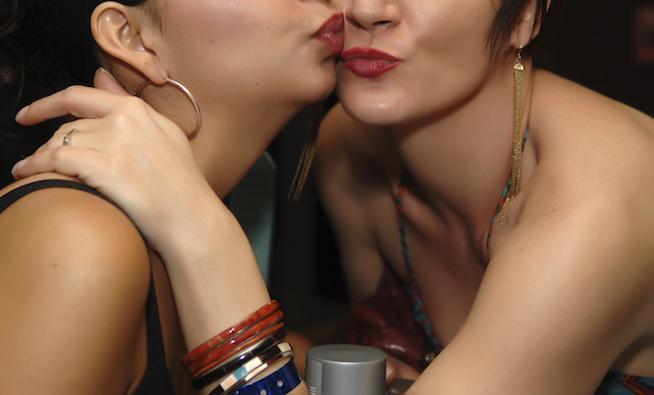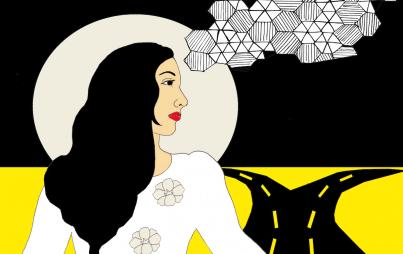
Bisexual women are subject to a particular brand of scrutiny thanks to the perception that they’re hooking up with women for the benefit of the male gaze.
Greedy. Confused. Slutty. If you’re bisexual, chances are you’ve heard these labels (and worse) thrown at you from all sides, probably even by people you consider friends. Although the U.S. is clearly a better place for LGBTQ people now than it was even a decade ago, not all sexualities are treated equally. Of course, being queer in a patriarchal society is still no walk in the park for anyone; in fact, 2016 is shaping up to be one of the worst years for anti-LGBTQ legislation. However, bisexual and trans individuals in particular are subject to some of the worst stigma in the LGBTQ community today. The issues facing the trans community deserve a whole series of articles of their own, but I’m here today to tell you that – to paraphrase Big Daddy Kane – bisexuality ain’t easy.
Research has shown that attitudes toward bisexuality are actually more negative than toward homosexuality, largely due to harmful stereotypes surrounding the orientation. How many times have you heard someone say they don’t “believe” in bisexuality – that it’s just a label people use when they’re afraid to admit they’re gay? Although it’s one of the most common stereotypes, that’s just the tip of the biphobic iceberg.
Bisexual women are subject to a particular brand of scrutiny thanks to the perception that they’re hooking up with women for the benefit of the male gaze. Even when the validity of our sexuality isn’t in question, our sex lives are considered a matter of public consumption: just look at the popularity of the “unicorn” myth, a.k.a. the stereotype of the attractive bisexual chick who’s up for a casual threesome. Do such women exist? Of course. Do they exist in the numbers that the most people seem to think? Absolutely not. Yet most people are far more comfortable making assumptions and asking invasive questions about bisexuality than they are with any other sexual orientation – and let me tell you, it gets exhausting.
Of course, the litany of comments directed at bisexual individuals rarely come from a place of malice. That being said, keep in mind that when you make certain comments that seem innocuous, bisexual people hear something totally different. (Also, they’ve probably heard the same thing a dozen times in the past week.) Let’s take a look at the worst offenders below.
1. “It’s just a phase.”
Translation: “I know your sexuality better than you do.”
Would you question someone’s sexuality if they had just come out to you as gay? Probably (and hopefully) not, but bisexuality is questioned so often that defending their sexuality becomes routine for anyone who’s interested in men and women. Of course, some people do identify as bisexual before going on to identify as gay later on, and there’s nothing wrong with that – but it has no bearing on the validity of anyone else’s orientation.
If you’re not bisexual, you may be thinking that nobody would explicitly express such a blatantly condescending view these days; I routinely have well-meaning friends, straight and gay, say they’ve never seen anyone dismiss bisexuality, so it must not happen. Unfortunately, that’s the same kind of reasoning that led B.o.B. to get into a kerfuffle with astrophysicist Neil deGrasse Tyson over the shape of the globe. Seeing isn’t always believing, especially when it comes to two things: Physics, and identities you aren’t a part of.
2. “It must be hard staying monogamous.”
Translation: “I hope it’s cool if I assume you’re promiscuous to the point of being unable to control yourself.”
This comment ties into the stereotype that all bisexuals are promiscuous; a surprising number of people refuse to date them out of the assumption that they’ll inevitably cheat. It’s pretty clearly biphobic, but as we discussed earlier, stereotypes surrounding bisexuality are sometimes so ingrained that they go unquestioned. However, the popularity of the “cheating bisexual” myth doesn’t make it true – if someone who is bisexual cheats, it has nothing to do with their sexuality and everything to do with being generally terrible.
3. “You have to like one more than the other.”
Translation: “Stop being greedy; you can’t like both genders equally.”
Although people rarely outright say bisexuality is greedy, it’s implied every time someone insists you pick a gender, even if they claim to be totally cool with your orientation. “Sure, you’re bisexual,” they say, “but which one do you like more?” Of course, not everyone prefers men and women equally – sexuality is a spectrum for most people – but that doesn’t take away from their identification as bisexual.
Unfortunately, admitting to preferring one gender over another is often used as justification for not being a “real” bisexual, as if you have to be an equal opportunist for it to count. By that logic, though, all the straight men with crushes on Idris Elba and straight women swooning over Ruby Rose aren’t “real” heterosexuals; they’re just confused. See how annoying it is?
4. “When you settle down, does that make you straight or gay?”
Translation: “Bisexuality is a phase that ends when you get married.”
It’s Schrodinger’s bisexual: When you’re dating someone of the opposite sex, you’re straight. When you’re dating someone of the same sex, you’re gay. When you’re single, you could be either, and people hate that. The reality, obviously, is that sexuality doesn’t change based on who you’re dating, but you’d be surprised at the number of people who disagree. This leads to a little thing called bi erasure, in which someone’s sexual identity is erased based on their current relationship. (See: Alan Cumming, Rachel Evan Wood, and any fictional character who utters the words, “I don’t like labels.”)
5. “So how many threesomes have you had?”
Translation: “I’m about to ask if you’ll make out with me while my boyfriend watches.”
Unless someone brings up the topic themselves, please stop with the invasive threesome questions. I beg of you. Please.







